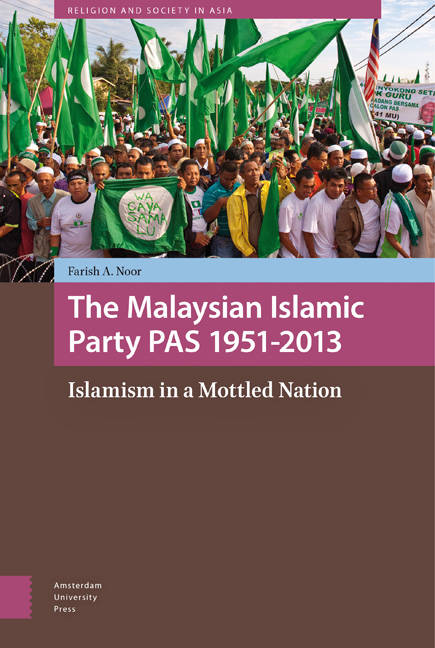Book contents
- Frontmatter
- Dedication
- Contents
- Introduction: Islamism in a Mottled Nation: The Story of PAS
- 1 1951-1969: The Orphan of the Cold War: An Islamic Party Steps on the Stage of Malaysian Politics
- 2 From Internationalism to Communitarianism: PAS as the Defender of Malay Rights: 1970-1982
- 3 PAS in the Global Islamist Wave: 1982-1999
- 4 The Jihad of the Ballot Box: PAS’s Democratic Experiment: 2000-2013
- 5 Religion, Politics, Islam, Islamism: What PAS Is, and What It Is Not
- Bibliography
- Index
3 - PAS in the Global Islamist Wave: 1982-1999
Published online by Cambridge University Press: 12 February 2021
- Frontmatter
- Dedication
- Contents
- Introduction: Islamism in a Mottled Nation: The Story of PAS
- 1 1951-1969: The Orphan of the Cold War: An Islamic Party Steps on the Stage of Malaysian Politics
- 2 From Internationalism to Communitarianism: PAS as the Defender of Malay Rights: 1970-1982
- 3 PAS in the Global Islamist Wave: 1982-1999
- 4 The Jihad of the Ballot Box: PAS’s Democratic Experiment: 2000-2013
- 5 Religion, Politics, Islam, Islamism: What PAS Is, and What It Is Not
- Bibliography
- Index
Summary
The rise of Islamism was only possible when the availability of Islam could be articulated into a counter-hegemonic discourse.
Bobby Sayyid, A Fundamental Fear: Eurocentrism and the Emergence of Islamism1982: The Ulama era begins
The image of PAS changed according to the tone set by the Shia revolution in Iran which gave such a high status to the ulama in the field of government … Many felt that their (ulama) personalities manifested the spirit of Islamic leadership that they were looking for all this time. Therefore the ulama became the object of adoration and respect for those who fought for the Islamist cause in society.
Badlihisham Mohamad Nasir, Isu Personaliti Dalam Gerakan Islam Tanah AirFrom 1982 the Pan-Malaysian Islamist party came under the leadership of the ‘ulama faction’, and subsequently transformed itself into a more conservative, oppositional and, at times, even revolutionary party. This did not, however, mean that PAS had discarded the internationalism of the era of Dr. Burhanuddin al-Helmy, and nor did it reject the Malay-Muslim ethnonationalism of the Asri years. As we shall see below, PAS's politics by the 1980s and 1990s would be marked by all three strains of Malay-Muslim thought and the party itself would grow progressively more complex as a result.
It ought to be noted that whatever revolutionary potential that PAS had was always there from the beginning. As I have argued in chapter one, it was between the late 19thto early 20th centuries that political Islam across Southeast Asia took on a more confrontational stance, and it was during this period that the region witnessed the first instances of violent anti-colonial opposition from the Islamist forces in British Malaya, the Dutch East Indies and Spanish Philippines. By the 1950s and 1960s, however, this radical brand of Islamism, predicated as it was on the desire to rid the Muslim world of colonialism, was transformed into something more internationalist in scope, tone and tenor. PAS in the 1950s and 1960s was one of several anti-colonial parties and movements that shared similar ambitions with other anticolonial movements, some of them secular in outlook and values.
- Type
- Chapter
- Information
- The Malaysian Islamic Party 1951-2013Islamism in a Mottled Nation, pp. 113 - 162Publisher: Amsterdam University PressPrint publication year: 2014



